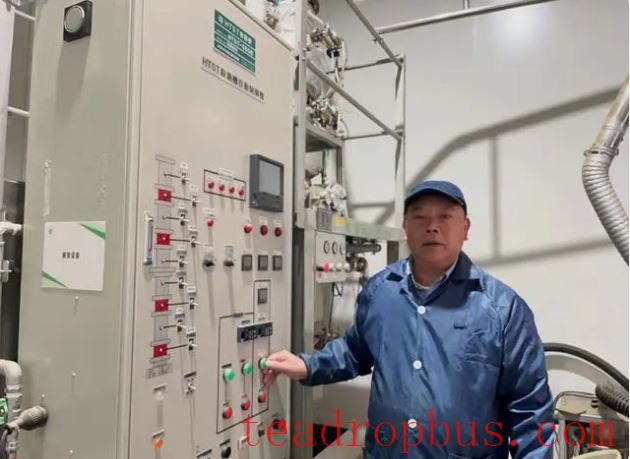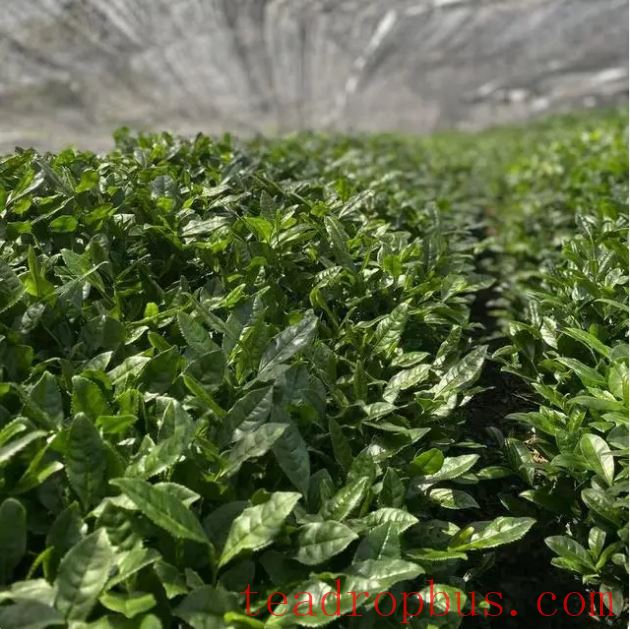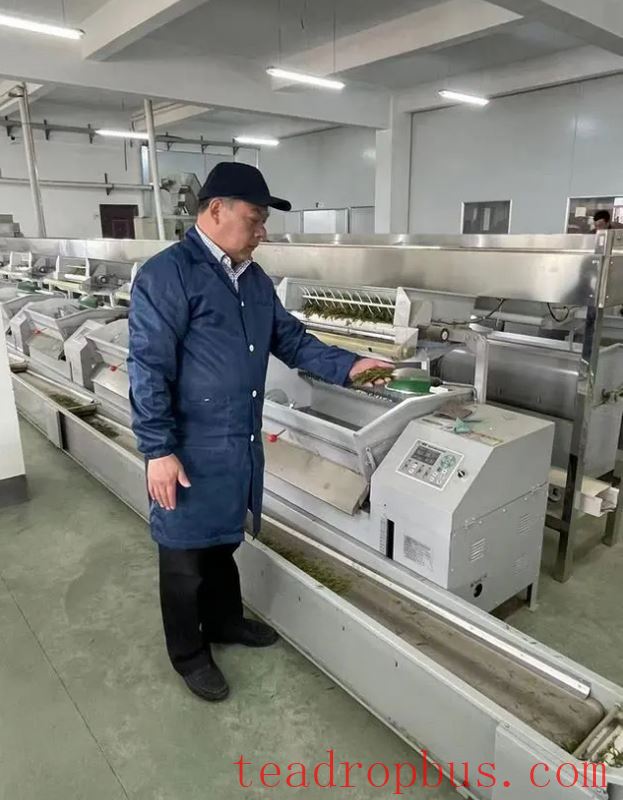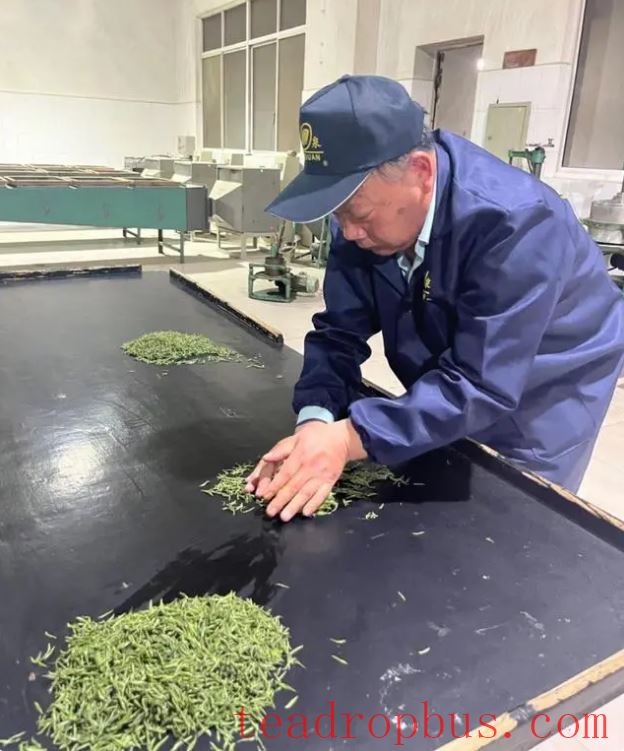July in Hangzhou is scorching hot, with the blazing summer sun. Inside the Matcha workshop of Hangzhou Yinquan Tea Industry Co., Ltd., the atmosphere is equally intense.
With machines running at full capacity, over one ton of matcha is produced daily. This bustling activity stems from a flurry of orders pouring in from all sides.
“This year, matcha orders arrived unusually early. Since the second half of last year, clients have been contacting us to place orders, whereas in previous years, orders typically came after production started in April. This year, orders came in half a year earlier,” said Lou Qingcan, founder of Hangzhou Yinquan Tea Industry Co., Ltd.
Hangzhou Yinquan Tea Industry Co., Ltd. is one of the first companies in Jing Shan Town, Yuhang District, Hangzhou, to produce matcha and has a tea plantation base covering 5,000 mu (approximately 333 hectares). Since its establishment around 2000, the company has built an advanced matcha purification workshop that can produce 600 tons of matcha annually, not only in Zhejiang Province but also nationwide.
In recent years, the demand for matcha has surged dramatically, stimulating a surge of interest. In 2025, Zhejiang Province's matcha production reached over 4,200 tons, with a value exceeding 600 million yuan, making it the world's largest matcha-producing region. Under Lou Qingcan's leadership, Hangzhou Yinquan Tea Industry Co., Ltd. also achieved a breakthrough in the value of its matcha business.
From initially venturing into matcha to constructing a new deep-processing facility, Hangzhou Yinquan Tea Industry Co., Ltd. represents just one example among Zhejiang's tea enterprises that have shifted their focus to matcha.

Photo provided by the interviewee showing Lou Qingcan at work.
Initiating the Venture: The Green Hue Returns to Jing Shan
In the meeting room of Hangzhou Yinquan Tea Industry Co., Ltd., there is a wall of honor adorned with award plaques. However, Lou Qingcan reserves the central position for the plaque “Jing Shan, Yuhang, Zhejiang – The Origin of Chinese Matcha.”
In 2025, Jing Shan tea received certification as a geographical indication product from the Ministry of Agriculture and Rural Affairs. That same year, Jing Shan was designated as “The Origin of Chinese Matcha” by the China International Tea culture Research Institute.
“This plaque is very significant. I had it specially replicated and placed in the company,” said Lou Qingcan. He believes this plaque officially recognizes Jing Shan as the origin of matcha, emphasizing that the beloved matcha is not just green but specifically Jing Shan green.
Jing Shan Town in Yuhang District has long been renowned for its tea. The “Tea Sage” Lu Yu, from the Tang Dynasty, once visited here and wrote the “Tea Classic.” Lou Qingcan, a native of Jing Shan, grew up among tea trees and has been involved in the tea industry for 35 years.
Initially, Lou Qingcan was involved in selling fresh tea leaves. In the early 1990s, he facilitated transactions with tea merchants from other provinces. With the capital earned from selling fresh tea leaves, he established his own tea factory in Jing Shan, producing premium teas, Black Tea, steamed green tea, and obtaining export qualifications. Over the past 20 years of engaging in export trade, Hangzhou Yinquan Tea Industry Co., Ltd.'s tea products have spread to 70% of countries worldwide.
Around 2000, Lou Qingcan collaborated with a Japanese company as a supplier of steamed green tea raw materials. The Japanese company introduced him to the basic processes of making matcha. He reflected, “Some well-known Japanese matcha companies have been operating for more than three hundred years. The origin of matcha lies in Jing Shan, yet we experienced a disconnection. There were very few tea factories around me that produced matcha.” Inspired, Lou Qingcan began researching matcha.
Matcha is not simply powdered green tea; each step in the production process is intricate. After being ground through a thousand grinds, the powder becomes as fine as hair and as light as dust. One essential step is shading. Similar to growing yellow chives, when tea leaves are shielded from sunlight, they strive to synthesize chlorophyll to capture more sunlight, while also decomposing and synthesizing large amounts of amino acids, lowering the phenol-to-amino acid ratio, which imparts the unique fresh and refreshing taste of matcha.

Photo provided by the interviewee showing the shading process.
When Lou Qingcan brought this technique back to Jing Shan, he set up nearly two-meter-high black nets in his tea garden. After 20 days of this “dark journey,” he witnessed a remarkable effect—the fresh tea leaves became extraordinarily lush and green. Even the collaborating Japanese company did not expect to see such high-quality matcha raw materials in Jing Shan.
Sensing an opportunity, Lou Qingcan quickly took the next step. He found a domestic matcha manufacturer and began supplying them with matcha raw materials from 2003. Lou Qingcan also started pondering equipment. He discovered that the ball mill used by Japanese companies produced superior results compared to commonly available equipment on the market, creating finely ground powder while preserving the vibrant green color of the matcha. In 2005, Lou Qingcan purchased two ball mills from the Japanese company, marking the beginning of his journey in matcha powder production.

Photo provided by the interviewee showing Lou Qingcan at work.
Transformation: A New Track, New Workshop, and New Talent
From spring's Jing Shan tea, tencha, to steamed green tea strips and flake tea during the summer and autumn seasons, as well as matcha produced throughout the year, one can witness the distinct tea-making processes of different seasons in the various workshops of Hangzhou Yinquan Tea Industry Co., Ltd.
The matcha workshop within Hangzhou Yinquan Tea Industry Co., Ltd. is currently the youngest workshop, constructed in 2025 and put into operation in 2025. It is an advanced matcha purification workshop, equipped with five ball mill rooms and one stone mill room, not only in Zhejiang Province but also nationwide.
Lou Qingcan approaches tea production with the dedication of a craftsman. “Whether it's steamed green tea, premium tea, or matcha now, quality is always the lifeblood of our brand,” he says.

Photo provided by the interviewee showing Lou Qingcan at work.
“Equipment sets the hardware standards and must meet or exceed these standards. In addition to the ten-thousand-grade purification workshop that meets medical industry standards, the company has also introduced industry-leading ultrasonic screening systems, high-temperature saturated steam sterilization production lines, far-infrared aroma-enhancing machines, and other equipment, with related investments exceeding 15 million yuan,” explains Lou Qingcan.
His pursuit of excellence truly manifests itself in his meticulous research into every aspect of the production process. Previously, many clients visiting the company to view samples would comment: “Your matcha doesn't have a strong enough nori flavor.”
The nori flavor of matcha made using Japanese tea varieties has become deeply ingrained. Lou Qingcan selected local varieties for producing tencha (the raw material for matcha), and he noticed that the nori flavor weakened somewhat when transforming tencha into matcha. Working with the company's technical staff, they conducted repeated tests using controlled variables and eventually decided to focus on the storage phase.
Originally, the company stored tencha in paper bags. After much experimentation, Lou Qingcan found that when tencha is